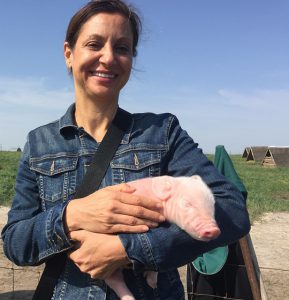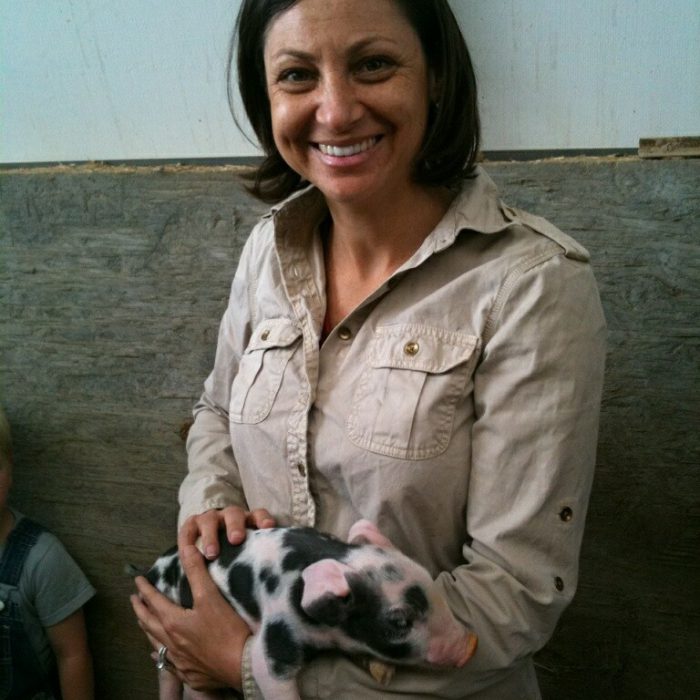Ep. 47: Live recorded at Johns Hopkins “Choose Food” Symposium – we welcome Maisie Ganzler, Chief Strategy & Brand Officer at Bon Appétit Management Company ||
For episode 47 we speak with Maisie Ganzler of Bon Appétit Management Company live recorded at the Johns Hopkins ‘ChooseFood’ symposium in Baltimore Maryland. Ganzler is Chief Strategy & Brand Officer at Bon Appétit Management Company, an on-site restaurant company offering full food-service management to corporations, universities, museums, and specialty venues. Based in Palo Alto, CA, the company operates more than 1,000 cafés in 34 states for dozens of marquee clients. Maisie has been instrumental in shaping the company’s strategic direction. We focus our discussion on the diverse sustainable initiatives and purchasing policies Ganzler has implemented in her 25 year career at Bon Appétit management company.
.
 The “ChooseFood” gathering was a collective effort of the Johns Hopkins Berman Institute of Bioethics, the Johns Hopkins Bloomberg School of Public Health, and the Hopkins Center for a Livable Future. The goal of the event was to evaluate the broad reaching ethics of food, and its production. Issues like Labor, environmental impact, externalities, animal welfare, health risk factors & new tech were all part of the ethical questions for food. Maisie was asked to share with the group some of the impact her work has had, and how the commitments at Bon Appétit have influenced some vast changes in the foodservice industry.
The “ChooseFood” gathering was a collective effort of the Johns Hopkins Berman Institute of Bioethics, the Johns Hopkins Bloomberg School of Public Health, and the Hopkins Center for a Livable Future. The goal of the event was to evaluate the broad reaching ethics of food, and its production. Issues like Labor, environmental impact, externalities, animal welfare, health risk factors & new tech were all part of the ethical questions for food. Maisie was asked to share with the group some of the impact her work has had, and how the commitments at Bon Appétit have influenced some vast changes in the foodservice industry.
.
.
 The “ChooseFood” gathering was a collective effort of the Johns Hopkins Berman Institute of Bioethics, the Johns Hopkins Bloomberg School of Public Health, and the Hopkins Center for a Livable Future. The goal of the event was to evaluate the broad reaching ethics of food, and its production. Issues like Labor, environmental impact, externalities, animal welfare, health risk factors & new tech were all part of the ethical questions for food. Maisie was asked to share with the group some of the impact her work has had, and how the commitments at Bon Appétit have influenced some vast changes in the foodservice industry.
The “ChooseFood” gathering was a collective effort of the Johns Hopkins Berman Institute of Bioethics, the Johns Hopkins Bloomberg School of Public Health, and the Hopkins Center for a Livable Future. The goal of the event was to evaluate the broad reaching ethics of food, and its production. Issues like Labor, environmental impact, externalities, animal welfare, health risk factors & new tech were all part of the ethical questions for food. Maisie was asked to share with the group some of the impact her work has had, and how the commitments at Bon Appétit have influenced some vast changes in the foodservice industry..
During our 40 minute discussion we dig deep into a few of the initiatives Ganzler described in her presentation, including her 1999 initiative “Farm to Fork” that buys meat, vegetables, and other products within a 150-mile radius of a client. In fact, (at a national level) at least 20% of Bon Appétit purchases meet this criteria. You’ll hear how of their pioneering initiatives to reduce food waste, work with small farmers, improve animal living conditions and ability to influence industrial scale agriculture to become more conscious & conscientious have evolved a minimum market entrance for their competitors. For this innovative company not afraid to draw a line in the sand – a dedication to ethics is paying off with positive business results. As you’ll hear in my conversation with Maisie, it’s all working for Bon Appétit because… it’s all authentic.
.
To hear of lessons learned and milestones gained by an industry leader at Bon Appétit is invaluable for us all. As we’re all consumers of it, we all have equal stake in food. For me, it’s inspiration and hope for what tomorrow can bring if/when we embrace ‘business ethics’ as a core competency in how we decide to vote for what we believe in – with our dollars – with our forks. TUNE-IN.
.
To hear of lessons learned and milestones gained by an industry leader at Bon Appétit is invaluable for us all. As we’re all consumers of it, we all have equal stake in food. For me, it’s inspiration and hope for what tomorrow can bring if/when we embrace ‘business ethics’ as a core competency in how we decide to vote for what we believe in – with our dollars – with our forks. TUNE-IN.
.
ChooseFood offered an opportunity to learn from leaders with a vested interest in food and how we produce it. Hearing from these diverse stakeholders fighting a similar battle reminded me how much our food is so deeply intwined into family, beliefs, culture and society – no matter where you come from on the planet. I left the symposium wondering if food ethics could be that common development language which would transcend many of the current differences we find in each other? We’re so much more alike than different – could food ethics be a reminder if not the primary ingredient for this panacea? Not sure, but a goal to find some insight and codify better practices that harmonize us and our surroundings on a shrinking planet just seems like a good idea!
.
..



